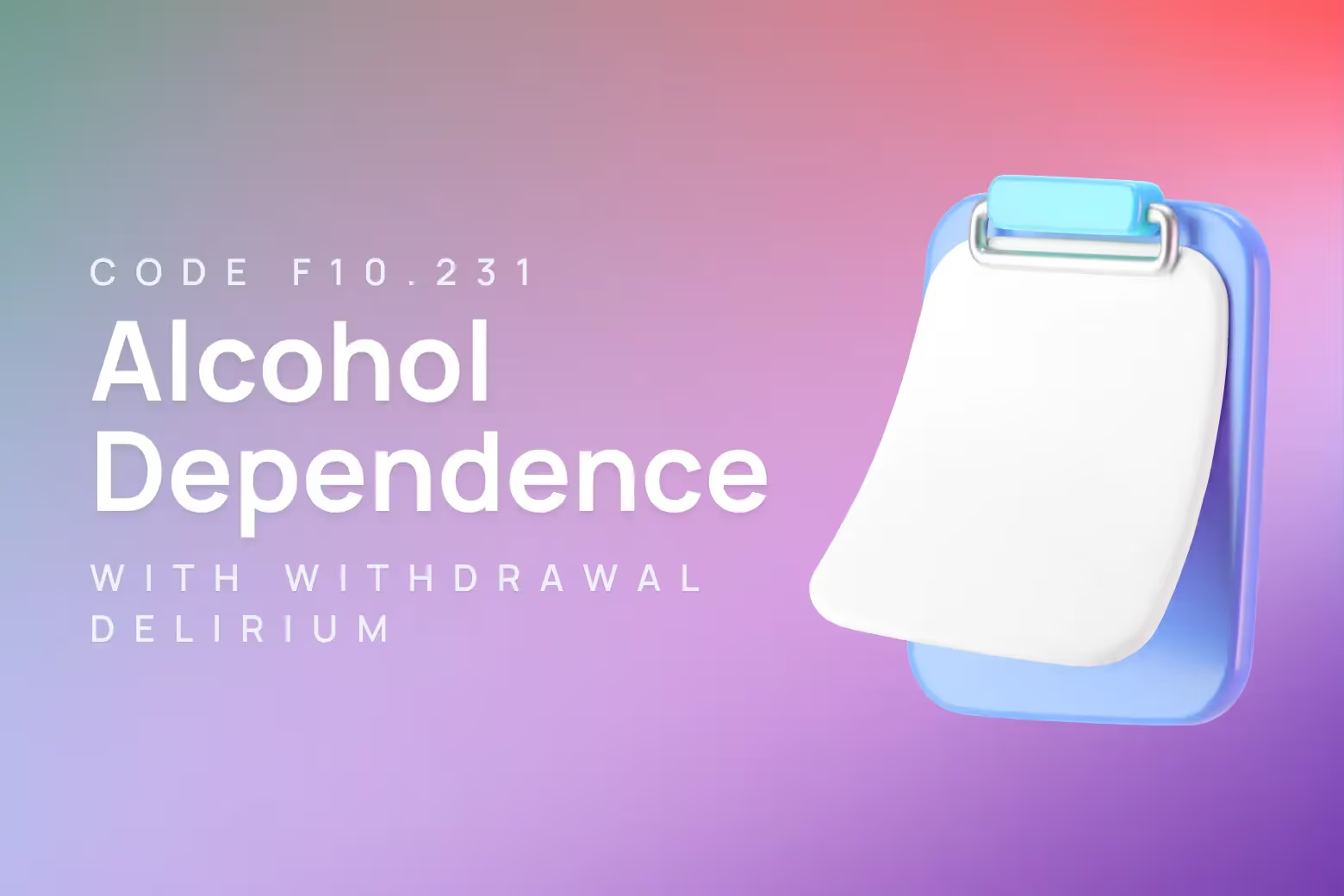ICD-10 code for alcohol dependence with intoxication, unspecified

F10.229 is the ICD-10 code for alcohol dependence with intoxication, unspecified.
This diagnostic code identifies cases where individuals meet criteria for moderate to severe alcohol use disorder while currently experiencing alcohol intoxication.
Accurate diagnostic coding supports appropriate treatment planning and billing compliance.
Key features:
- Applies when moderate or severe alcohol dependence occurs with concurrent intoxication
- Fourth character "2" indicates moderate to severe alcohol use disorder severity
- Used when alcohol dependence and intoxication are both present during assessment
- Requires documentation of both dependence symptoms and current intoxication signs

Diagnostic criteria for alcohol dependence with intoxication (F10.229)
Clinicians must establish the presence of both alcohol dependence and current intoxication to assign this code accurately.
The diagnosis requires evidence of significant alcohol-related functional impairment alongside acute intoxication symptoms.
For alcohol dependence, the individual must demonstrate a problematic pattern of alcohol use resulting in clinically significant impairment or distress.
This pattern manifests through at least four of eleven possible symptoms occurring within a 12-month period for moderate severity or six or more symptoms for severe dependence.
Core diagnostic requirements include:
- Alcohol consumed in larger amounts or over longer periods than intended
- Persistent desire or unsuccessful efforts to reduce or control alcohol use
- Considerable time spent obtaining, using, or recovering from alcohol effects
- Strong cravings or urges to use alcohol
- Recurrent alcohol use causing failure to fulfill major obligations at work, school, or home
- Continued use despite persistent social or interpersonal problems caused by alcohol
- Abandonment of important activities due to alcohol use
- Recurrent use in physically hazardous situations
- Continued use despite knowledge of physical or psychological problems caused by alcohol
- Tolerance demonstrated by need for increased amounts or diminished effects
- Withdrawal symptoms or use of alcohol to relieve withdrawal
Current intoxication must be clinically evident through observable signs such as altered consciousness, impaired coordination, slurred speech, or positive blood alcohol levels.
When to use F10.229 diagnosis code
Understanding when to apply F10.229 versus related alcohol-related codes requires careful attention to both severity and current presentation.
This code specifically addresses cases where significant dependence coincides with active intoxication.
F10.229 vs F10.129 (Alcohol dependence with intoxication, mild)
F10.129 applies when individuals meet criteria for mild alcohol use disorder (2-3 symptoms) with concurrent intoxication.
F10.229 is reserved for moderate to severe cases where 4 or more diagnostic criteria are present. The presence of more extensive symptoms typically indicates greater functional impairment and treatment complexity.
F10.229 vs F10.20 (Alcohol dependence, uncomplicated)
F10.20 represents alcohol dependence without current intoxication or other complications.
Clinicians choose F10.229 when the person presents with clear signs of acute alcohol intoxication during assessment.
The presence of intoxication often affects treatment planning and immediate safety considerations.
F10.229 vs F10.239 (Alcohol dependence with withdrawal, unspecified)
F10.239 addresses cases where alcohol dependence occurs with withdrawal symptoms rather than intoxication.
These represent different phases of the addiction cycle - F10.229 captures active use periods while F10.239 addresses cessation periods with withdrawal complications.
Related ICD-10 codes
- F10.10 - Alcohol use disorder, mild
- F10.129 - Alcohol dependence with intoxication, mild
- F10.20 - Alcohol dependence, uncomplicated
- F10.230 - Alcohol dependence with withdrawal, uncomplicated
- F10.231 - Alcohol dependence with withdrawal delirium
- F10.239 - Alcohol dependence with withdrawal, unspecified
- F10.921 - Alcohol use, unspecified with intoxication delirium
- F10.929 - Alcohol use, unspecified with intoxication, unspecified
Interventions and CPT codes for alcohol dependence with intoxication
Evidence-based treatment approaches for F10.229 must address both the acute intoxication and underlying dependence. Treatment typically begins with immediate safety assessment and medical stabilization when needed.
Initial assessment and diagnostic evaluation
Comprehensive psychiatric diagnostic evaluation forms the foundation of treatment planning.
Clinicians conduct thorough assessments examining drinking patterns, dependence symptoms, and current intoxication severity. Initial evaluations also screen for co-occurring mental health conditions and medical complications.
CPT 90791 - Psychiatric diagnostic evaluation covers initial intake assessments establishing alcohol use disorder diagnosis and treatment planning.
Individual psychotherapy interventions
Cognitive behavioral therapy represents the most strongly supported psychosocial intervention for alcohol dependence.
CBT helps individuals identify triggers, develop coping strategies, and prevent relapse.
Motivational interviewing effectively addresses ambivalence about change and strengthens commitment to recovery.
CPT 90834 - Psychotherapy, 45 minutes for standard individual therapy sessionsCPT 90837 - Psychotherapy, 60 minutes for extended individual sessions requiring more intensive intervention
Screening and brief intervention services
Structured screening combined with brief intervention proves effective for many individuals with alcohol problems.
These approaches work particularly well in healthcare settings where alcohol use screening identifies problems requiring immediate attention.
CPT 99408 - Screening and brief intervention, 15-30 minutes for commercial insuranceCPT G0396 - Assessment and brief intervention, 15-30 minutes for Medicare patientsCPT H0049 - Alcohol screening for Medicaid programs requiring H-codes
Family and group therapy approaches
Family involvement significantly improves treatment outcomes for alcohol dependence.
Family therapy addresses relationship dynamics, enables support system development, and helps family members understand addiction as a medical condition requiring ongoing management.
CPT 90847 - Family psychotherapy with patient presentCPT 90853 - Group psychotherapy for peer support and skill development (guidelines-for-the-treatment-of-alcohol-problems.pdf)
How Upheal improves F10.229 ICD-10 documentation
Clinical documentation for alcohol dependence with intoxication requires careful attention to diagnostic specificity and billing compliance.
Upheal's clinical documentation platform helps behavioral healthcare providers manage these complex documentation requirements efficiently.
Suggesting appropriate ICD-10 codes based on session content
Upheal's AI analyzes session content to identify relevant diagnostic indicators and suggest appropriate ICD-10 codes.
The platform recognizes patterns indicative of alcohol dependence severity and concurrent intoxication, helping clinicians select between F10.129 and F10.229 based on documented symptoms.
This feature reduces coding errors and improves diagnostic accuracy.
Maintaining HIPAA-compliant records with proper diagnostic coding
The platform automatically generates comprehensive treatment notes that include appropriate diagnostic codes while maintaining strict HIPAA compliance.
Upheal ensures that alcohol-related diagnoses are properly documented with supporting clinical evidence, reducing audit risks and improving reimbursement success rates.
Reducing administrative burden so you can focus on client care
Manual documentation of complex cases like F10.229 can consume significant clinical time.
Upheal automates note generation, code suggestion, and compliance checking, allowing clinicians to spend more time providing direct patient care rather than managing paperwork.
This efficiency particularly benefits providers treating individuals with co-occurring intoxication and dependence.
Supporting clients with alcohol dependence
Individuals presenting with F10.229 often require immediate medical evaluation to ensure safety during intoxication episodes.
Treatment planning must address both acute intoxication management and long-term recovery goals. Successful outcomes typically require comprehensive approaches combining medical care, psychotherapy, and social support.
The presence of intoxication during assessment provides important clinical information about drinking patterns and treatment needs.
Many individuals with alcohol dependence experience shame and ambivalence about seeking help, making therapeutic rapport particularly important for engagement.
Recovery from alcohol dependence represents a long-term process requiring ongoing support and monitoring.
Treatment success often depends on addressing underlying factors contributing to alcohol use, developing effective coping strategies, and building strong recovery support networks.
Upheal's clinical documentation platform supports providers treating complex alcohol use disorders by ensuring accurate diagnostic coding and comprehensive treatment documentation.
Try Upheal today to improve your practice's efficiency while maintaining the highest standards of clinical care and documentation compliance.













